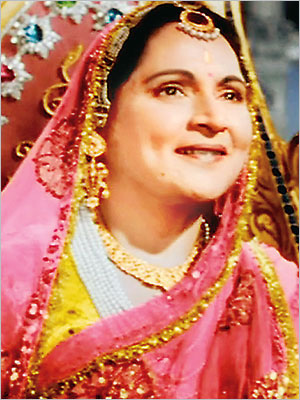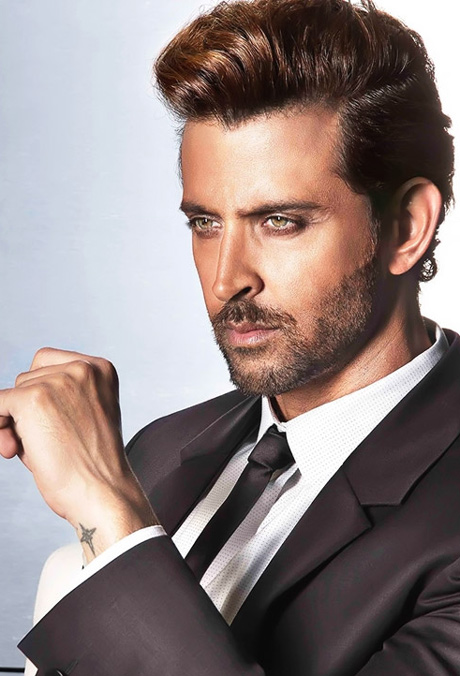Bollywood Masala Mix
broke a social taboo

Actress Durga Khote (January 14, 1905 − September 22, 1991) started as one of the foremost leading ladies of her times who remained active in Hindi and Marathi cinema, as well as theatre, for over 50 years, starring in around 200 films and numerous theatre productions.
In 2000, in a millennium issue, India Today named her amongst "100 People Who Shaped India", noting, "Durga Khote marks the pioneering phase for woman in Indian Cinema" as she was one of the first women from respectable families to enter the film industry, thus breaking a social taboo.
She additionally ranks amongst the top ten actresses in mother roles in Hindi cinema, most notable amongst them were as Jodhabai in K. Asif's Mughal-e-Azam (1960), as Kaikeyi in Vijay Bhatt's classic, Bharat Milap (1942); her additional memorable roles as mother were in Charnon Ki Dasi (1941), Mirza Ghalib, Bobby (1973) and Bidaai (1974). She received the highest award in Indian cinema, the Dadasaheb Phalke Award (1983), for lifetime contribution to Indian cinema.
She was born as Vita Laud, to a family which hailed from Goa and spoke Konkani at home. Her father's name was Pandurang Laud and her mother's name was Manjulabai. She grew up in a large joint family in Kandewadi and was educated at Cathedral High School and St. Xavier’s College where she obtained her B.A. While still in college, she married into the Khote family, graduated and settled down with her husband.
By the age of 26, Durga Khote was a widowed mother with two young sons, Bakul and Harin. She had to seek work in film to support her children. In doing so, she became a pioneer of sorts: she hailed from a traditional family and the film industry was regarded as the preserve of the base and the bawdy. Also, most of the female characters were played by men at the time.
Durga Khote debuted in a minor role in an obscure 1931 silent film, Farebi Jaal, by the Prabhat Film Company, followed by Maya Machindra (1932). She was soon promoted to play heroine in the 1932 double version (Hindi and Marathi) Ayodhyecha Raja, another Prabhat film, which was the first-ever Marathi talkie and proved to be a runaway hit, where she played the role of Rani Taramati. Indeed, she ventured yet into another pioneering trend: despite working closely with Prabhat Film Company, she broke away from the "studio system" (exclusive contract with a studio to work in its films on a monthly salary) then in vogue and became one of the first "freelance" artistes of that era by working occasionally with the New Theatres, East India Film Co. (both at Calcutta), and Prakash Pictures.
In 1936, she played Saudamini in Amar Jyoti, which is one of her most "memorable" roles.
In 1937, she produced and directed a film titled Saathi, making her one of the first women to step into this role in Indian cinema. The 40s opened for her in a big way, with award-winning performances in Aachary Atre's Payachi Dasi (Marathi) and Charnon Ki Dasi (Hindi) (1941) and Vijay Bhatt's classic, Bharat Milap (1942), both of which got her the BFJA Best Actress Award for two consecutive years.
Durga Khote remained active in the theatre circuit for a number of years, especially the Marathi theatre in Mumbai. She was actively associated with the Indian People's Theatre Association (IPTA) and worked in several plays for the Mumbai Marathi Sahitya Sangh. In 1954, she famously performed the role of Lady Macbeth, in V.V. Shirwadkar's Marathi adaptations of Macbeth, as Rajmukut, The Royal Crown, along with Nanasaheb Phatak.
Durga Khote played a wide variety of roles over a career that wasn't only long but additionally untouched by scandal. She was the inspiration for several generations of Indian actresses, including veterans like the late Shobhna Samarth, who frequently spoke of how she had been inspired by Khote's example.
During later years, she played several important character roles, like the mother of the protagonist. Her portrayal of Jodhabai, the queen of Akbar torn between duty towards her husband and love towards her son in Mughal-e-Azam (1960) was well received. She went on to play additional widely appreciated character roles in later movies like the role of the grandmother of the heroine in Bobby (1973), the hero's aunt in Abhimaan (1973), and the really memorable Bidaai (1974), where she played a mother, a quite sensitive role that can make one cry, and received the Filmfare Best Supporting Actress Award.
In 1963, she acted in Merchant Ivory's debut film, The Householder (1963), and her final memorable role was in Hrishikesh Mukherjee's Bawarchi (1972).
She acted in over 200 films in her career. By the 1980s she successfully diversified into production of short films, ad films and documentaries by setting up Fact Films and, later, Durga Khote Productions, which produced the Doordarshan TV series Wagle Ki Duniya.
Her two sons Bakul and Harin were born from her first marriage with Vishwanath Khote. It was a traditional marriage into an orthodox family. Vishwanath Khote was from a millionaire family who were, at that time, the largest share brokers and road contractors. Vishwanath was a mechanical engineer from Banaras Hindu University who passed away young. After she was widowed, Khote had an unsuccessful second marriage to Mohammed Rashid. Harin himself passed away at a young age, and was survived by his wife, Vijaya Mehta and two sons.
Her grandchildren include Ravi, a filmmaker; granddaughter Anjali Khote; grandson Deven Khote, a television producer, and a noted film producer, making films like Jodhaa Akbar and Life in a Metro.
Sharda Mukherjee, the ex governor of Gujarat and Andhra Pradesh and wife of India's first air chief marshal Subroto Mukherjee was her first cousin (mother's sister's daughter). Sharda Mukherjee's paternal uncle Ranjit Sitaram Pandit was married to Jawaharlal Nehru's sister Vijaylaxmi Pandit.
Her brother-in-law, Nandu Khote, was a noted stage and silent movie actor. His daughter Shubha Khote acted in Hindi films debuting in Seema (1955). She later directed and produced Marathi films and entered television in the 90s. Viju Khote, most known for his role of Kalia in Sholay (1975) is a noted character actor, and younger brother of Shubha. Shubha's daughter, Bhavna Balsaver, is an award-winning TV actress. They appeared together in 1993's sitcom Zabaan Sambhalke on DD Metro.
Later in life she wrote her acclaimed autobiography in Marathi which was later translated into English as I, Durga Khote, and moved to Alibaug, near Mumbai. She passed away on September 22, 1991.

Asked if he sees himself directing in the future, Hrithik said, "I love acting, it's my passion. Maybe someday if I feel it's the right time for me to go behind the camera, I will. I'm a man who loves challenges."
Hrithik, who is the son of filmmaker Rakesh Roshan, made his acting debut in 2000 with the blockbuster 'Kaho Naa... Pyaar Hai'.
Touching almost two decades in Hindi filmdom, the actor has been a part of several films like 'Kabhi Khushi Kabhie Gham...', 'Koi... Mil Gaya', 'Krrish', 'Dhoom 2', 'Jodhaa Akbar' and 'Guzaarish'.
"It's been 17 years since I made my debut in Bollywood and as I look back, it's very nostalgic for me. My time in the industry has taught me a lot and helped me grow into the person I am today. My career in the movies has been very rewarding and I cherish each moment," said Hrithik.
He feels "more evolved" every year and with every film.
Is there anything he would like to change about his journey?
"Not at all! It has been an amazing journey so far and hopefully there is a lot more to come. Not only did I get a chance to be a part of some amazing films, but also work with some really talented people," he said.
Hrithik, 43, said he wouldn't change a thing about how his professional life has turned out.
"I have no regrets and I wouldn't change a thing," said the father of two, who was married to Sussanne Khan.
The actor was last seen on screen in 'Kaabil', where he portrayed a blind man seeking revenge for his wife's murder.
The Hindi film industry has seen a sudden surge of message-based films in the industry in the recent past. Asked if he feels Bollywood is seeing a new phase where films with messages and dealing issues are taking over commercial films, he said: "Indian cinema is the largest in the world and has stood the test of time, making it so unique."
Films have a strong impact on the audience, he feels.
"Cinema in India is the biggest form of entertainment and with a great impact on people. In today's day and age, I feel films have become a powerful medium to deliver a message to the audience," he said.
Hrithik said in the capacity of being the brand ambassador of luxury timepiece brand, for which he launched a new sport inspired collection earlier this week.
"Watches for me are just not an accessory but an integral part of my wardrobe and style. They are also the best way to keep track of time as I believe time management is the key to success," he said.
Hrithik is also a lot into sports.
"It helps you learn discipline, face challenges and is a great way for keeping fit. Also, I think we are in an era where sports is getting the importance that it deserves on a national and a global level."
"Srijan Chowdhury, 17, a student of class 11 from South Point School allegedly committed suicide by hanging himself in his house in south Kolkata's Kalighat area. His body was recovered on [last week] Monday night and has been sent for autopsy," said an officer from Kalighat police station.
According to family members, Chowdhury, who was visibly depressed over the past few days, started behaving strange after watching the horror film with his friends.
"My son looked unmindful and disturbed after watching the film. We asked him what was wrong but he did not tell anything. We never imagined he would take such a step," his mother said.
The body of Chowdhury was found hanging from the ceiling of his room when they broke down the door after not getting any response from him for a long time, she added.
Police said they have seized the boy's mobile phone and would be quizzing the friends who accompanied him to the theatre.